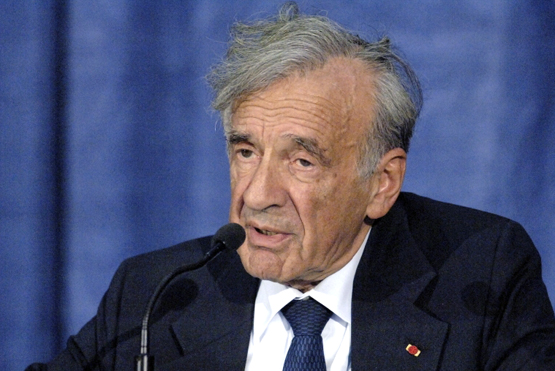Elie Wiesel Confronts Job
Tonight’s lecture delves into the troubling tale of a good man’s suffering

The Coen brothers aren’t the only ones talking about Job these days. The Biblical figure will be the topic of tonight’s lecture by Elie Wiesel (Hon.’74), BU’s Andrew W. Mellon Professor in the Humanities and winner of the 1986 Nobel Peace Prize.
Every fall since 1975, the human rights activist, author, and Holocaust survivor has given a series of free public lectures called Three Encounters with Elie Wiesel: The Fascination with Jewish Tales. Tonight, the first lecture, In the Bible: Job Revisited, examines the ancient story with a contemporary eye.
“The Book of Job is not easy, because it contradicts itself,” says Rabbi Joseph Polak (Hon.’95), director of Hillel House and rabbi to BU’s Jewish community. “It asks many questions, but resolves none of them.”
The Old Testament Book of Job attempts to address the problem of reconciling the existence of evil with the existence of God. When virtuous Job endures unbearable suffering at the hand of Satan, he refuses to curse God. His piety is eventually rewarded, but a question remains: why did God allow Job to suffer when he’d done nothing wrong?
“I expect Elie will ask a similar question,” says Polak. “What did one and a half million children murdered during the Holocaust ever do? What would God say to them?”
At 15, Wiesel and his family were deported to the Nazi concentration camp Auschwitz. His mother and younger sister died there. He and his father were later taken to Buchenwald, but his father perished before the camp was liberated in 1945.
Wiesel went on to become a scholar, a teacher, and the author of more than 50 books, including the memoir Night, an account of his experience during the Holocaust. A new English-language edition of Night, first published in Yiddish in 1956, came out in 2006 and became a best seller. Last summer, Wiesel accompanied President Barack Obama and German Chancellor Angela Merkel on a tour of Buchenwald.
On Monday, November 2, Wiesel will further explore the role of Satan in his second lecture, In the Talmud and Other Sources: Satan in Ancient Memories. The final lecture, on Monday, November 9, is called In Our Own Time: The Tragedy of the Saint Louis. Polak, also a Holocaust survivor, will deliver the introduction to the lecture, about the German ocean liner that in 1939 attempted without success to land at several ports with more than 900 Jewish refugees from Nazism.
“Westerbork, the transit camp where my family was deported, was filled with refugees from the Saint Louis,” he recalls. “It sailed from port to port — it even stopped in Miami, Fla. — but no one wanted them. So many of the refugees perished in Nazi concentration camps anyway.”
All lectures in the series Three Encounters with Elie Wiesel: The Fascination with Jewish Tales take place in the George Sherman Union’s Metcalf Hall, 775 Commonwealth Ave., and are free and open to the public. Doors open at 6 p.m. for the 7 p.m. events. Overflow seating is available in the Conference Auditorium. For more information, call 617-353-2238.
Vicky Waltz can be reached at vwaltz@bu.edu.
Comments & Discussion
Boston University moderates comments to facilitate an informed, substantive, civil conversation. Abusive, profane, self-promotional, misleading, incoherent or off-topic comments will be rejected. Moderators are staffed during regular business hours (EST) and can only accept comments written in English. Statistics or facts must include a citation or a link to the citation.